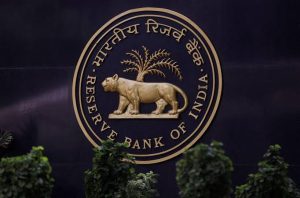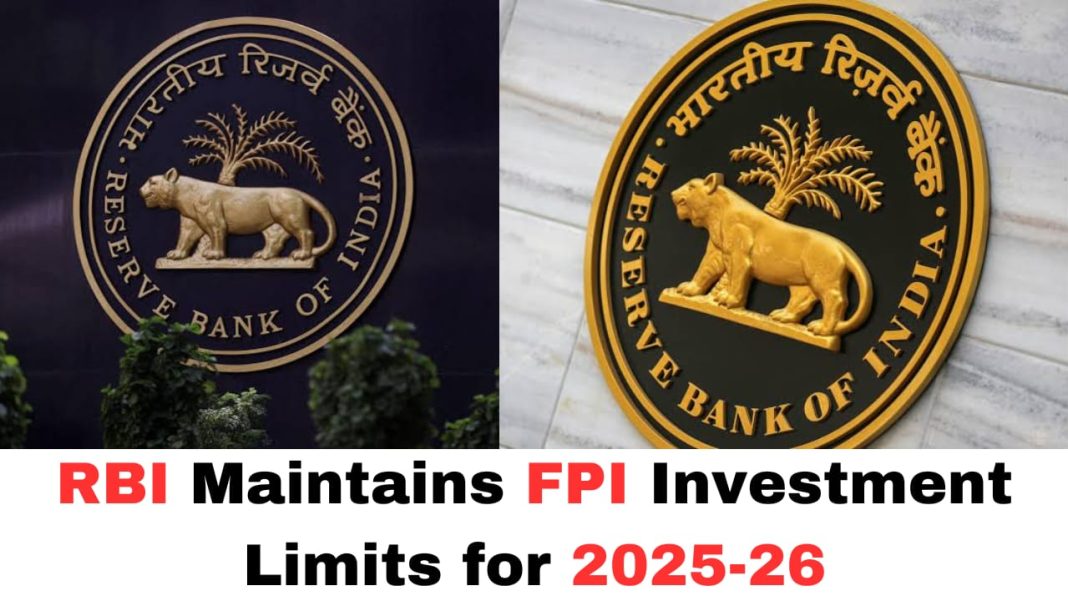Digital News Guru National Desk:
The Reserve Bank of India (RBI) has announced that it will maintain the current investment limits for Foreign Portfolio Investors (FPIs) in government and corporate bonds for the financial year 2025-26. This decision, made as part of RBI’s annual review of investment norms, ensures stability in the bond market and aligns with India’s broader strategy of integrating into global financial markets. The move reflects RBI’s cautious approach towards foreign investments in India’s debt market while balancing the need for capital inflows.
Key Highlights of the Announcement
On April 3, 2025, RBI issued a circular confirming that the investment ceilings for FPIs in the bond market would remain unchanged from the previous fiscal year. The limits are as follows:

- Government Securities (G-Secs): FPIs can invest up to 6% of the total outstanding stock of central government securities.
- State Government Securities (SG-Secs): The cap is maintained at 2% of the total outstanding stock of state government securities.
- Corporate Bonds: The investment limit remains at 15% of the outstanding stock of corporate bonds.
This announcement ensures that the rules governing FPI participation in India’s debt market remain predictable and stable, which is crucial for investor confidence.
Why Did RBI Maintain the Existing Limits?
RBI’s decision to keep the limits unchanged is influenced by several economic and financial considerations:
- Ensuring Market Stability
Frequent changes in investment limits can lead to volatility in bond yields and foreign exchange fluctuations. By maintaining the status quo, RBI provides certainty to foreign investors and ensures that debt markets remain orderly.
- Controlling Dependence on Foreign Capital
While foreign capital inflows are beneficial, over-reliance on FPIs for debt financing can make the economy vulnerable to sudden outflows during global financial shocks. By capping FPI participation, RBI ensures that domestic investors continue to play a dominant role in India’s bond market.
- India’s Gradual Inclusion in Global Bond Indices
India’s government bonds were added to JP Morgan’s Emerging Markets Bond Index in 2023, leading to increased foreign inflows. More recently, FTSE Russell and Bloomberg Barclays have also considered India’s bonds for inclusion in their global indices. Given these developments, RBI likely wants to observe market behavior before making any major policy shifts.
- Supporting the Indian Rupee
A surge in foreign inflows could lead to excessive appreciation of the Indian rupee, affecting India’s export competitiveness. Conversely, sharp withdrawals by FPIs can lead to rupee depreciation. By maintaining stable investment ceilings, RBI aims to minimize currency fluctuations.

Impact on Financial Markets
- Bond Market Reactions
The decision to keep limits unchanged has been viewed as a neutral to positive move for the bond market. Since there is no sudden influx or outflow of foreign funds, bond yields are expected to remain steady. Stability in the bond market is essential, particularly at a time when global interest rates remain uncertain.
- Foreign Investor Sentiment
For foreign investors, policy predictability is crucial. By maintaining investment limits, RBI assures long-term investors that they can plan their Indian bond investments without unexpected regulatory changes. However, some global investors were expecting a relaxation in limits, given India’s recent progress in global bond market integration.
- Impact on the Indian Rupee
Since the announcement does not significantly alter foreign investment flows, the impact on the rupee exchange rate is expected to be minimal. However, any global market disruptions or geopolitical risks could still affect foreign capital flows and influence the rupee’s stability.
- Corporate Borrowing Costs
Since corporate bond investment limits remain unchanged, companies seeking funds from overseas investors will not see additional FPI inflows. This means corporate borrowing costs will continue to be driven by domestic market conditions, rather than foreign capital movements.
The Road Ahead: Will RBI Ease FPI Limits in the Future?
While RBI has chosen to retain the current limits for now, it remains open to reviewing these caps in the future. Several factors could influence a potential relaxation of FPI investment ceilings:
- Increased Inclusion in Global Bond Indices
With India’s growing presence in global bond indices, demand for Indian bonds from foreign investors is likely to increase. If India’s macroeconomic fundamentals remain strong, RBI may consider raising the limits to accommodate greater foreign participation.
- Fiscal Deficit Management
If the government faces challenges in managing its fiscal deficit, it may encourage higher foreign participation in bond markets to ensure adequate funding. However, this would depend on India’s external debt management strategy.
- Interest Rate Trends
The global interest rate cycle also plays a role in FPI investment patterns. If the U.S. Federal Reserve lowers interest rates, India could see higher foreign inflows, prompting a reassessment of investment limits.
- Emerging Market Trends
India competes with other emerging markets for foreign investments. If countries like Brazil, Indonesia, or South Africa offer more attractive bond investment policies, India may need to adjust its FPI limits to remain competitive.

Conclusion
The RBI’s decision to maintain FPI investment limits for 2025-26 reflects a carefully balanced approach aimed at ensuring market stability while gradually integrating India into global financial markets. By keeping foreign capital flows predictable, RBI ensures that India’s debt market remains stable and resilient in an uncertain global economic environment.
While there is no immediate change, the future of FPI investment limits will depend on global economic trends, India’s fiscal policies, and the evolving role of foreign investors in the country’s debt market. As India continues to attract global capital, RBI’s policy decisions will play a crucial role in shaping foreign investor confidence and economic growth.
You May Also Read: Poonam Gupta Appointed as RBI Deputy Governor








